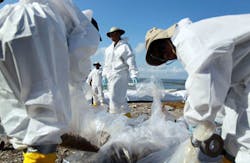Private landowners get more help to restore ecosystem from Deepwater Horizon spill
The Deepwater Horizon explosion and oil spill in 2010 had a significant impact on the wildlife and habitat in the Gulf of Mexico region and the full extent of the harm caused by the accident may not be known for many years.
Ongoing efforts to restore the Gulf Coast ecosystem will be supported through a new partnership announced this week by U.S. Agriculture Secretary Tom Vilsack.
The Natural Resources Conservation Service (NRCS), part of the Department of Agriculture (USDA), is teaming up with the National Fish and Wildlife Foundation (NFWF) to provide more help to private landowners in the Gulf states. The aim is to support conservation projects that will enhance existing recovery efforts in Louisiana, Alabama, Florida, Mississippi and Texas.
"The health of the Gulf ecosystem will be decided by how well we treat the private lands that make up most of this region," Secretary Vilsack pointed out.
This partnership builds on work already being carried out by the two organizations in the region. For example, NRCS works with farmers, ranchers and private landowners to make improvements to their land by cleaning the water and air, enhancing the habitat for local wildlife and enriching the soil.
The new initiative will expand conservation efforts with private landowners and operators who may not be eligible to participate in existing recovery programs.
Potential projects include wetlands conservation work; stream and riparian buffer restoration; and farm and ranch land protection, including improving soil health, implementing no-till farming and enhancing the local wildlife habitat.
NRCS and NFWF have both agreed to invest $20 million, and further commitments of up to $30 million from each partner are possible over the next four years.
Under legal settlements from early 2013, BP and Transocean agreed to pay $2.544 billion to NFWF to fund projects benefiting the natural resources of the Gulf Coast that were impacted by the spill.
